As a theater director: What world does Jarunun Phantachat create?
Nakamura: I saw both The Test of Endurance in 2015 and a dress rehearsal of Ceci n'est pas la politique premiered in 2015 and restaged in 2017. They impressed me with their interaction with the audience.
In the Test of Endurance, for example, while you and the other performer are detachedly performing "a traditional dance", the audience must decide when to leave the venue. It is an open-ended performance. You are continuously and single-mindedly dancing until all members of the audience leave the venue. When you leave the venue, you are confronted with a microphone and have to respond to it. You are caught in such a situation.
Ceci n'est pas la politique also frequently asks the audience whether they agree or disagree during the performance. It characteristically evolves like a game according to the majority of answers. What kind of problems did you face in adopting the method that spawned such interactions?
Jaa: I created these two pieces after the coup d'état occurred in Thailand in 2014. I created The Test of Endurance because I could not understand why the coup was happening. A coup happened in Thailand again. Why was it so often repeated in Thai history? Why does Thai society accept it? Why do I feel this is part of our culture? We say "Thai democracy" whose meaning I don't understand. These and other questions made me create this piece. I forced the audience to decide when to leave the theatre because I wanted to ask them how far they can tolerate the situation and why they are there.
Ceci n'est pas la politique is also deeply related to political and social questions of what Thai democracy is. This piece tells the story of people who vanish, are kidnapped, and suddenly detained by the army or government when walking around their houses. I never want to be a person who overlooks disappearing people or information, so I decided to put this question to the audience, who must choose. For I am convinced that everything we choose as we live in society will affect politics. For example, do you agree with the opinion that a person who has chosen an idea must be excluded from society because he is not good for it?
Recently, we have often discussed whether a person who has raped someone must be sentenced to death. If you agree with this, you will allow one person to be put to death. So, I try to provide the occasion to vote for the audience. As a result, something vanishes from the stage. That is to say, since a person disappears, the scene itself also disappears, making the whole incomprehensible. Whenever you see this play, you cannot understand it because something always disappears. This reflects the reality of Thai society.
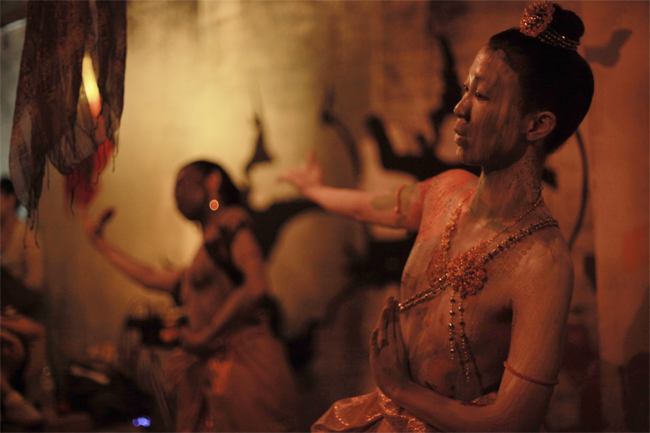
Photo by Withit Chantamarit
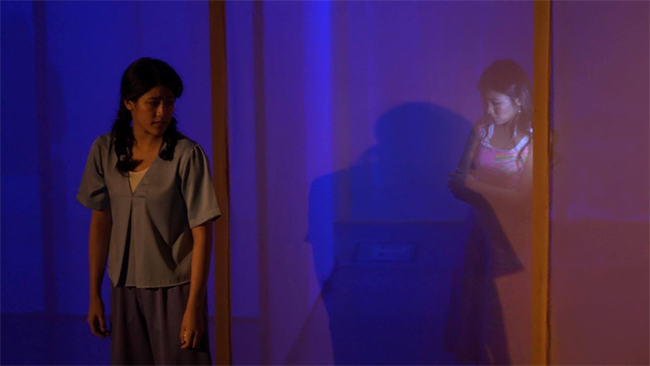
Photo by Wichaya Artamart
Nakamura: After the coup in 2014*13 , Ka-ge from B-Floor stood in front of the Bangkok Art and Culture Center (BACC) to protest against it. Some student activists were detained and professors were fighting against it. Why did you decide to restage Ceci n'est pas la politique in 2017?
*13 Military coup of 2014
A coup staged by the sitting Prime Minister Prayut Chan-o-Cha, the former Commander in Chief of the Royal Thai Army who led the National Council for Peace and Order (NCPO). He forbade demonstrations, and reinforced suppression of free speech and regulations on expression. He detained a number of activists and intellectuals.
Jaa: After all, nothing changed in society in 2017. That's why I decided to restage it.
Nakamura: When talking about these two pieces, you impressed me with the words, "Thai democracy". What do you mean by the modifier "Thai"?
Jaa: I don't know myself.
I don't know, but if I figure it out from the words and actions of those who want to create something "Thai", there are people called "Kondi" (good people) who govern the country. And we are supposed to believe in such "good people" whose wise voice must be louder. I just don't know. I can't understand it, I mean this way of thinking. For those who believe in this thought, good people ultimately amount to our prime minister. I wonder what "goodness" represents for them. On the whole this is a very conservative idea. I can't understand it.
A new project launched: Collective Thai Scripts
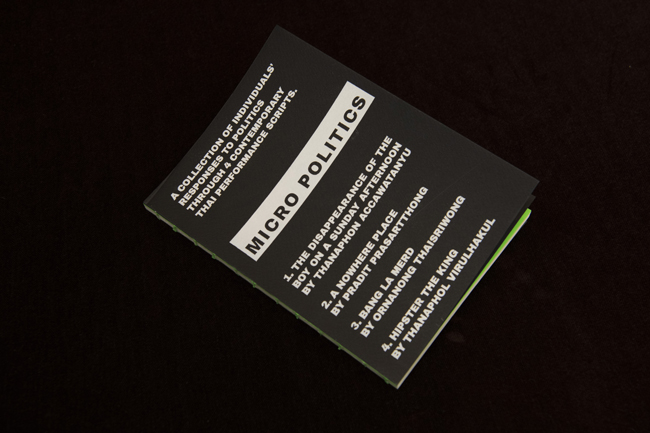
Nakamura: Living in a very chaotic Thai society, you explore its realities. This approach seems to relate to your activities. You have recently launched a new project called Collective Thai Scripts, triggered by awareness of thus far undocumented or unpublished Thai contemporary "plays". Theatre students study Western classics such as Shakespeare at Thai universities. By contrast, you apparently focus on examining and discovering your own language and stories. You have managed to produce and publish the first volume – many congratulations on it!
The current issue contains four "plays" with special reference to "micro-politics". What characteristics do contemporary Thai plays have? What did you yourself discover in the process of preparing it?
Jaa: What I have discovered in the production process is the fact that a person who writes a "play" can be at times a stage director and at times a performer. She writes the "play", not because she wants people to read it, but because she assumes that it is performed on the stage; so, what she writes is a sort of "production notes". This made it very difficult edit the "plays" to be included in the volume. I actually visited people who wrote the "plays" to ask questions like: "How would you like to add stage direction in the script?" "What does it represent?" We even watched a video together to transcribe it. It was like working backwards. And then I had a hard time translating them. The Thai language has a lot of ambiguous expressions. When you translate them into English, you can't sometime find exact words. At the beginning we wanted to translate them in sequence, which the editor would check at the end. But this didn't work. So the playwright and I sat together with two translators. All of us worked together as we checked the meaning of words to look for diction that could convey ambiguous meaning as desired by the author. We also had to examine the cultural or linguistic context.
Nakamura: Could you be more specific about the difficulties of translation?
Jaa: A Nowhere Place*14 by Pradit Prasartthong has many numbers. It enumerates historical events such as the Buddhist calendar*15 as numbers. In one of the scenes, the character goes to the doctor. When asked about his age, he says he is "55 years old". In Thai, 55 is pronounced as "hâahâa". This is a joke. "hâahâa" sounds similar to "haha" or "laugh". The Thai people write 55 to express "haha" when they laugh. So, the character says, "55 years old, haha". The doctor then says, "Why are you laughing?" The play includes such a gag scene. This is funny only in Thai. It does not come off in English. It's impossible to translate it as "five five" or "laugh". In such a case, the translators said, "We can't translate it; it's just not possible." In the end we used another play on words. In the scene after that, numbers are associated with political history.
*14 Pradit Prasartthong
The first recipient of the Silpathorn Award for Performing Arts for his masterful mixing and adaptation of traditional art forms to create contemporary performances. The Artistic Director of Anatta Theatre Troupe. Also Secretary General of Bangkok Theatre Network, which is the organizer of the Bangkok Theatre Festival.
*15 The Buddhist calendar
A calendar generally used in Thailand. It starts with the year of Buddha's death as year 0. In the Thai Buddhist calendar, 2019 is 2562.
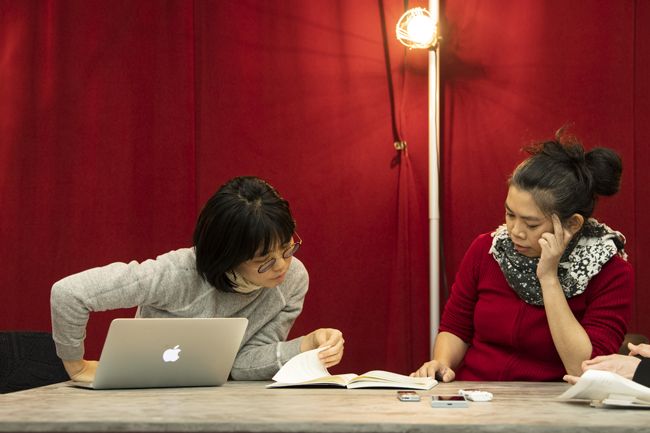
Nakamura: "5555" I often come across on Facebook or LINE, meaning "that's so funny" in Japanese. It's a kind of crack, isn't it? Tam's (Thanapol Virulhakul's*16 ) Hipster the King has no dialogue but only subtitles. How did you translate it as a "play"?
*16 Thanapol Virulhakul
Thanapol Virulhakul began to involve himself in conceptual dance performance as a dancer, choreographer and director to investigate his interest in and question on human perception of themselves and the world after studying film and photography at Thammasat University. He has been a co-artistic director of Democrazy Theatre Studio in Bangkok since 2013. Among his recent works are Hipster the King (2014) that received three awards from the Thailand centre of the International Association of Theatre Critics and toured in Germany and Japan, Girl X (2015), a collaboration with Suguru Yamamoto (Japan), and Happy Hunting Ground (2016), a co-production with Badisches Staatstheater Karlsruhe (Germany) as well as The Retreat, which was presented at TPAM2019 as work-in-progress open workshop.
Jaa: Tananop Kanjanawutisit*17 , another co-founder of Collective Thai Scripts, watched its video to discover certain kinds of rules, transcribed and wrote it. Translators team and I edited and made it more certain in using words and symbols for the whole script.
*17 Tananop Kanjanawutisit
Theatre practitioner, focusing on dramaturgy and producing, based in Bangkok. He has been a member of Democrazy Theatre Studio since 2012 and worked in the company as performer, producer and dramaturg in pieces include Boxes, Hipster the King, Happy Hunting Ground and The Retreat.
Nakamura: Is it like looking for instructions?
Jaa: There are codes. A code signifies a certain gesture for the actor. Some parts are determined like this. This was tough, you know.
Nakamura: We have the Kishida Prize for Drama, the most prestigious award for playwrights in Japan. Mr. Toshiki Okada is one of the judges. The playwrights who have supported contemporary theatre select and award a young playwright while discussing what a play is. The discussion centers on criteria that disregard "plays" that have no dialogue, for example. This perplexes Mr. Okada a lot. Seen from this Japanese standard of discussion, Collective Thai Scripts is very creative and innovative. How did you define a "play"?
Jaa: We did not question the form of play; dialogue was not a must. This time we selected the pieces that depict how society or politics affects a person who may be an artist or a small being. We had a preference for pieces set in around 2014. The book documents what happened in those days. At the time when the military coup took place, what were theatre people doing? What happened to me? It represents a kind of voice in the theatre world.
Nakamura: Publishing "plays" helps to pass them on to later generations. It assumes that published plays can be taken up by other stage directors and can put them out into the world. It is an act of making them independent. You put society into question not through productions, but through "plays". Do you have any message to the future? What do you want to communicate to contemporary artists?
Jaa: I have never thought of affecting later generations of artists. My objective is to archive Thai plays. Each of the four playwrights says, "I want to see how my script is performed by other people quite soon." It can be performed by theatre students or professional actors. Though some are not directly political, they are very interesting as creative inspiration. Each can be interpreted in a number of ways and has very ambiguous elements. I hope they will be performed from a new perspective.
Nakamura: You have variable English versions, too. It will be interesting if Thai plays are performed overseas. Thank you very much.
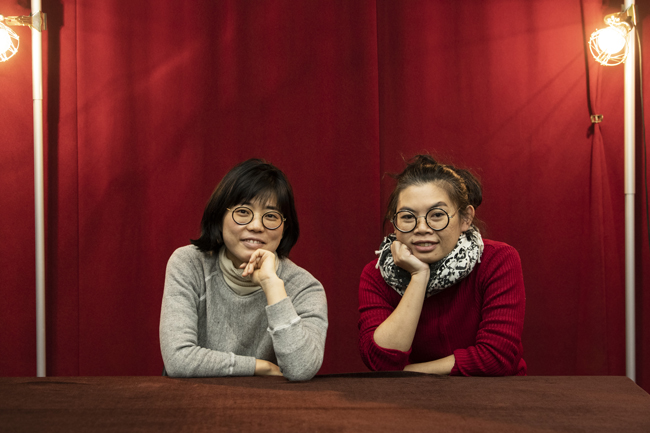
[On February 10, 2019 at mass×mass Kannai Future Center]
Further information about PRATTHANA: A Portrait of Possession / Asia in Resonance 2019
PRATTHANA – A PORTRAIT OF POSSESSION / Asia in Resonance 2019
Special Website
Interviewer: Akane Nakamura
Representative Director of precog Co., Ltd.. precog has produced the works of artists inside and outside Japan, including Toshiki Okada's chelfitsch, Mikuni Yanaihara's Nibroll, Norimizu Ameya and Yudai Kamisato, and handled international tours and joint productions in 70 cities in 30 different countries. In 2009, she established Drifters International with Kao Kanamori (AWRD) and the architect Teppei Fujiwara. She served as Performance Program Director for the Kunisaki Art Project 2012 and Kunisaki Art Festival 2014, and Co-Curator of Jejak-Tabi Exchange: Wandering Asian Contemporary Performance beginning in 2018. She is Asian Cultural Council (ACC) Grantee for 2016 and one of the directors of the Open Network for Performing Arts Management (ON-PAM).
Interview photo: Toru Hiraiwa






